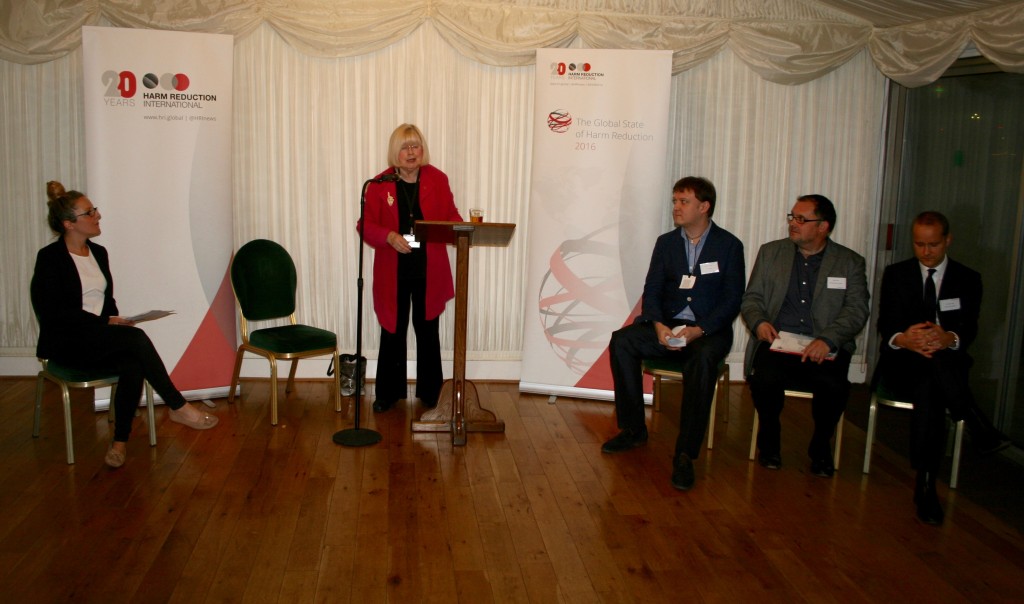The All-Party Parliamentary Human Rights Group (PHRG) and Harm Reduction International (HRI) launched HRI’s biennial flagship report: Global State of Harm Reduction 2016 on 16 November in Parliament, to mark the 20th anniversary of HRI. The report is the fifth in a series that tracks developments in harm reduction worldwide as well as the human rights of people who use drugs.
We would like to thank PHRG Chair, Ann Clwyd MP, for hosting the event.
The speakers at this event were:
- Ann Clwyd MP – PHRG Chair (AC);
- Conradin Rasi – First Secretary and Deputy Head of the Economic Section at the Embassy of Switzerland in the UK (CR);
- Rick Lines – HRI Executive Director (RL);
- Ivan Varentsov – HRI Board Member, activist and representative of the Andrey Rylkov Foundation for Health and Social Justice (IV);
- Katie Stone – HRI Research Analyst and author Global State of Harm Reduction 2016 report (KS).
The main points include the following:
- The Global State of Harm Reduction 2016 report highlights areas in which progress is needed, for example of the 158 countries and territories where injecting drug use is reported, 78 have no opioid substitution therapy in place. One in every five prisoners around the world is being held on drug-related charges, and the report highlights that ‘prison-based harm reduction is extremely vulnerable to budget cuts, financial crises, and changes in political environments globally’. The report draws attention to the ‘gap between the international commitments made over the last two years and the levels of financial and political leadership being shown by both national governments and international agencies’.
- The provision of harm reduction is a legally binding human rights obligation and in some areas there has been improvement in harm reduction, such as the introduction of opioid substitution therapy provision in Kenya, Senegal and Monaco, and the provision of drug consumption rooms in ten countries. (KS)
- The ‘war on drugs’ has shown to be a failure. US$100 billion is being spent globally on the ‘war on drugs’ every year which is having little impact on drug consumption, while there is a shrinking of funding for harm reduction. (KS)
- There are many human rights violations linked to drug control and enforcement: one clear example is that of Philippine President Duterte’s campaign to end drug use resulting in the extra-judicial killing of more than 2,500 people since July 2016. (AC)
- There are a number of challenges facing harm reduction including a funding crisis and lack of political will. International donor funding for HIV response is in decline, and in Europe there has been a drop in government funding resulting in service closures. (AC)
- The Russian drug policy is conservative and repressive, and drug users are considered to be criminals as opposed to patients. Just under one fourth of Russia’s prison population are serving a sentence for drug-related crimes, and Russia has one of the fastest growing HIV epidemics in the world, with 70% of HIV cases associated with injecting drugs. The NGO regulations introduced in Russia in 2012 require any NGO receiving foreign funding and undertaking ‘political activities’ to be registered as ‘foreign agents’, equal to being officially designated as a traitor and which could lead to the imposition of sanctions. Increasingly the law is being applied to HIV prevention organisations. (IV)
The PHRG and HRI will continue their co-operation in an effort to raise greater awareness of how current drug policies throughout the world can result in serious human rights violations, and to bring about redress and reform. The PHRG will also continue to monitor the situation regarding harm reduction closely and to raise its concerns with relevant interlocutors.
More generally, as people who use drugs whose rights are violated are often vulnerable and marginalised, the PHRG hopes to challenge any stigma connected to them and their plight by raising related issues in Parliament and more widely.
The full HRI Global State of Harm Reduction 2016 report is available here.

